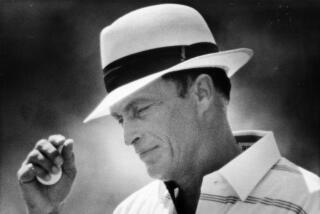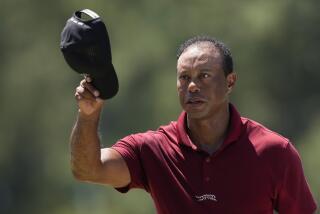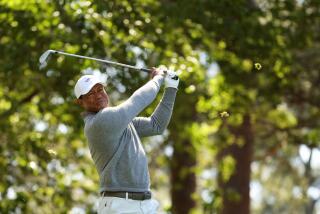THE YEAR OF THE OLD SPORT : IT’S MORE THAN A GOLDEN MOMENT FOR THE GOLDEN BEAR : Jack Nicklaus, at 46, Wins the Masters a Sixth Time and Also Serves This Notice: Never Write Him Off
- Share via
As he walked toward the 18th green at Augusta, toward his sixth Masters championship, his 20th victory in a major tournament, it came to Jack Nicklaus that there would be no more encores.
What could he expect to do that he had not already done? His place in the game’s lore secure, now he was 40 feet and 2 putts away from bridging the generation gap.
Those who had followed his career since he won his first U.S. Amateur in 1959 obviously knew who he was and what he had achieved. With this Masters championship 27 years later, he had given the younger fans, who thought he should be part of history, not making it, something to remember. There was nothing left to prove.
His eyes welling with tears as the gallery at No. 18 gave him an ovation like even he never had heard before, he recognized the moment and seized it. It was, he knew, at 46, time to quit, and unlike Arnie and Snead and even Hogan, he was going out in style, wearing the green jacket.
But what does a golfer do when he retires?
Plays golf, naturally.
So Nicklaus, in something resembling a farewell address, says that his days as a touring professional are behind him, and that, while he will continue to play the major tournaments, he no longer expects to be a contender.
But just as you are about to present him the gold watch and tell him thanks for the memories, Nicklaus, just in case the lesson has not been learned, warns that you should not write him off.
Never again.
Nicklaus remembers well the first time he picked up a newspaper and read that he was over the bunker. He had not yet turned 30.
After winning the U.S. Open for the second time in 1967, he did not win another major championship until the 1970 British Open.
“Everybody said that I wasn’t dedicated, that I had won too much too soon and that all I cared about was my business interests,” Nicklaus said.
Everybody included not only us sportswriters, the usual suspects, but also at least one fellow player, Frank Beard, who wrote a book around that time about his life on the tour.
“Frank said I’d never win anything again,” Nicklaus said.
Forty PGA tournament victories, 10 major championships and 15 years later, Nicklaus was addressing the press at the 1985 Masters when asked about the remarks of another player. David Ogrin was quoted as saying that Nicklaus’ eyesight was not as sharp as it had been.
Nicklaus shrugged.
“David Ogrin?” he said.
But as Nicklaus returned to Augusta 12 months later, having won only one tournament since 1982, there was no reason for anyone viewing the situation objectively to believe there was another green jacket in Nicklaus’ future.
We should have known better. For the first time in more than two decades, Nicklaus was not invited to the press room before the tournament to discuss his chances. That invitation had become something of a Masters ritual.
When someone read him an article from one of the Atlanta newspapers, he discovered the reason. It apparently was because no one among the press thought he had any chance to win.
All of the facts were there. In seven 1986 tournaments, Nicklaus’ best finish had been 39th. He had missed the cut in three tournaments and withdrawn from another.
The Golden Bear had become the Olden Bear.
Nicklaus clipped out the article and taped it to the refrigerator in the house where he was staying. It was not the first time a refrigerator contributed to victory in a major sporting event in 1986, but it was the most dramatic.
Four strokes off the lead entering the final round, Nicklaus moved into contention, and transformed a quiet, polite crowd into a swarming, screeching army, with birdies at Nos. 9, 10 and 11.
“You could hardly hear yourself think,” another contender, Tom Kite, said, referring to the thunder created by the gallery.
Then, after a bogey on 12, Nicklaus birdied 13 and eagled 15. With another birdie on 16, he tied Greg Norman, Seve Ballesteros and Kite for the lead. It was his outright with a final birdie on 17.
Ballesteros could have caught him but didn’t.
Kite could have caught him but didn’t.
Norman could have caught him but didn’t.
After two-putting on 18 for par, Nicklaus had a final round of seven-under 65 and a total score of 279, nine strokes better than he shot to win the tournament 20 years earlier.
“Augusta was a very, very special time,” he said when asked if this Masters championship was the most satisfying victory of his career.
“I’ve had a couple of other special times, a lot of special times. But at that tournament, the people really poured their heart out to me. It got to me. When that happens, you don’t want to let them down.
“When I got on a roll after playing some pretty good golf, I had to keep them going. You forget how old you are, how you’ve been playing or any past history. All you think about is the moment.
“As I got to 18, all the birdies were behind me. All I wanted to do was get my putt down in two. I’m a pretty emotional guy. I don’t show it, but I feel it inside. I had tears in my eyes. I was thinking about the people and what they had given to me, and I wanted to give something back to them.
“But I had to think, ‘Wait a minute, don’t get wrapped up in everything. You still have to hit that putt.’ ”
Even then, Nicklaus did not forget to stop and smell the azaleas. He knew it might be the last time they ever smelled quite so sweet.
“Age is not a factor in golf,” he said. “Physically, if you keep yourself in good condition, and mentally, if you stay hungry, you can play golf for a long time. Arnold (Palmer) is 10 years older than I am, and he’s not ready to give up anything.
“But your priorities change over a number of years. I made a decision after the Masters that if I was ever going to leave the game, that would be the time.
“I am very lucky. Arnold was playing well enough to win long beyond the time when he won his last major tournament. He probably could have won a major up to 10 years ago. Certainly, he could have won at my age, maybe beyond my age.
“But I was fortunate enough to do it, to win the Masters at 46. So it seemed liked the right time to turn around and say, ‘Guys, go ahead. I’ve done my thing.’
“I’ll still play golf. I may even be a contender. But I’m not going to go out there every week and work my tail off. I’ve done enough of that.”
Nicklaus has played less each year. In 1986, he played only 16 tournaments, still finishing 32nd on the PGA money-winning list with $226,015.
But he said he plans to play in no more than 10 official tournaments in the future.
“Basically, I’m going to leave the tour,” he said. “I’ll play the four major tournaments, two tournaments prior to the Masters (AT&T; Pebble Beach, Doral-Ryder Open), the Memorial, the Canadian Open, and that’s going to be about it. With that kind of schedule, you can’t consider yourself to be playing the tour.
“I’ll try to compete in the majors, and maybe I will. But I don’t think I’m going to be playing enough golf to be good enough when it comes to the majors.”
He paused. Nicklaus, being Nicklaus, did not like the way that sounded.
“But who knows?” he said. “I had won only $4,000 and missed the cut several times before the Masters last year. I’ve had enough experience to know how to win if I can get in that position. I’m not going to say I’ll never win again.”
At this point, who would?
More to Read
Go beyond the scoreboard
Get the latest on L.A.'s teams in the daily Sports Report newsletter.
You may occasionally receive promotional content from the Los Angeles Times.










